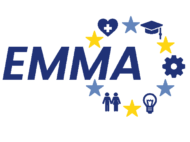DEVELOPING CURRICULUM FRAMEWORK: moving from a vision to deciding the structure and rules of a Masters program
This blog concentrates on the development of curriculum framework for EMMA Master program. To do this, we gathered information both about national and university level requirements and recommendations for master programs. Correspondence between European Qualifications Framework (EQF) and National Qualifications Frameworks (NQF) was regarded. We also collected descriptions of current best pedagogical practices in the partner universities. Based on this process, the aims and learning outcomes of the EMMA Master program were developed. We also discussed and defined the pedagogical framework and fundamentals for assessment. In addition, the structure of the curriculum, including the amount of ECTS in the program and in both core and elective studies was discussed.
Interdisciplinarity and age-inclusivity as aims of the program
The aims of the program were defined already in the planning phase of the project. Interdisciplinarity is one of the most important aims of EMMA program. Promoting active ageing and age-friendly society calls for the contribution of different disciplines and for developing interdisciplinary approaches. Ageing phenomena appears in different fields of life and we need interdisciplinary understanding and co-operation in order to develop new solutions together.
The EMMA program also aims at promoting age-inclusivity. This requires positive and resource-focused orientation, based on ethics and sustainability. We aim at empowering professionals to work for policy changes both at local and national levels. In this ethos, the professionals need to perceive older people as partners and change agents.
Expected learning outcomes
The learning outcomes in the EMMA program include being able to influence active and healthy ageing, assess the interplay between personal, societal and global factors, and co-operatively evaluate the characteristics of age-friendly society. In promoting active and healthy ageing and age-friendly society, it is crucial to emphasize the perspectives and subjectivity of older people, as well as to collaborate with other relevant perspectives. The graduates of the program are expected to facilitate intergenerational exchange and dialogue which is important for understanding the needs of an ageing population and also for promoting an equitable society for all.
Conducting research and applying research are learning outcomes which we discussed profoundly during the process. Some partner universities focus more on doing research and some on applying research. Our common understanding is that both learning to conduct research an to apply research results are of importance in this program and the students should have the choice on which they focus. These learning outcomes are signified for promoting active and healthy ageing and age-friendly society. This can be seen as value-based and political goal of the program: the graduates are expected to act for change in culture, attitudes and practices concerning ageing.
Student Centred Learning
In EMMA program, we will employ the Student Centred Learning (SCL) approach. The fundamental aim of the SCL approach is the autonomy and critical ability of the learners. Learning outcomes are of major importance, guiding the pedagogical solutions. We strive for constructive alignment, which means that we plan the content, learning activities and teaching methods to be aligned with the learning outcomes.
We emphasize active learning: the students are autonomous subjects of their learning process. Critical and analytical learning and understanding are demanded in the European Qualifications Framework (EQF) on level 7, meaning Master level studies. Facilitating student centred learning requires respect and trust in the learners’ ability in knowledge creation and critical thinking. In addition to supporting the achievement of the learning outcomes of the program, co-operative learning and learning communities are keys to interdisciplinary co-operation in working life. Thus, SCL serves to empower students with skills that reach far beyond the Masters program duration.
Author information
Tuula Kukkonen, PhD, Principal lecturer
Karelia University of Applied Sciences, Finland


